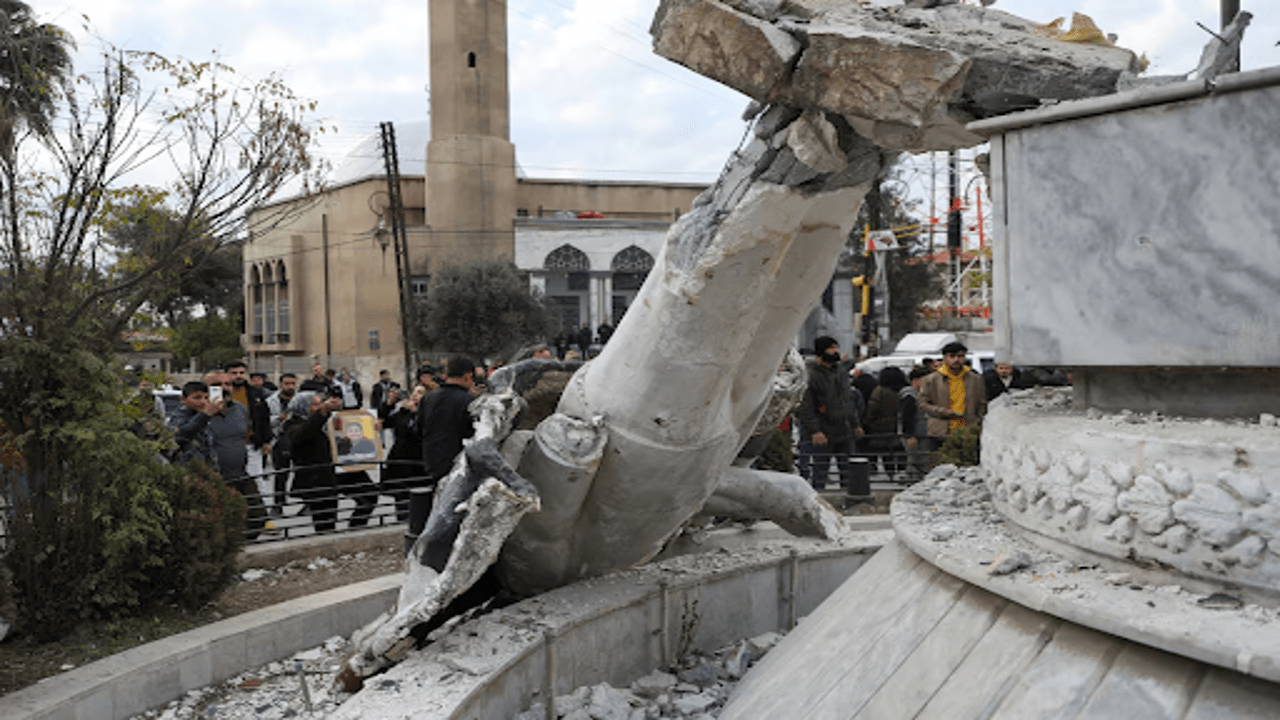
People gather near a damaged statue of former Syrian President Hafez al-Assad in Qamishli, Syria, on December 8, 2024, following the announcement by Syrian rebels that they have removed President Bashar al-Assad from power. Reuters
Syria entered a new chapter of hope and uncertainty on Monday after the sudden fall of President Bashar al-Assad’s regime. Rebels captured the capital city, Damascus, marking the end of a 13-year civil war and over five decades of autocratic rule by the Assad family. Assad fled to Russia, where he was granted asylum, bringing a dramatic shift to the political landscape of the Middle East.
The swift takeover was led by a coalition of militias spearheaded by Hayat al-Tahrir al-Sham (HTS), a group previously linked to al-Qaeda. This development is seen as one of the most significant geopolitical shifts in the region in generations. Assad’s ouster removed a key stronghold where Russia and Iran had exerted influence across the Arab world.
International reactions poured in as governments acknowledged the end of Assad's rule. U.S. President Joe Biden described Syria’s current situation as precarious, marking the first time in years that neither Russia, Iran, nor Hezbollah held sway over the nation. Japan’s Chief Cabinet Secretary, Yoshimasa Hayashi, confirmed Tokyo’s close monitoring of events in Syria.
Smoke fills the air in Damascus, Syria, on December 8, 2024, after Syrian rebels declared they had removed President Bashar al-Assad from power. Reuters
The overthrow of Assad has wide-reaching implications. It curtails Iran's ability to supply weapons to its allies and poses challenges to Russia’s naval operations in the Mediterranean. For millions of refugees living in camps across Turkey, Lebanon, and Jordan, this might signal the hope of returning home.
Syria’s rebels now face the enormous task of reconstructing a nation devastated by war. The conflict has left hundreds of thousands dead, cities reduced to rubble, and an economy crippled by international sanctions. The country will require billions of dollars in aid to rebuild its infrastructure and society.
Speaking to an enthusiastic crowd at Damascus’ Umayyad Mosque, HTS leader Ahmed al-Sharaa, also known as Abu Mohammed al-Golani, declared this moment a victory for the region. He vowed to make Syria “a beacon for the Islamic nation” through hard work and unity.
Meanwhile, the collapse of Assad’s government brought the release of thousands of political prisoners. Families were seen weeping as they reunited with loved ones who had been detained for years in the notorious Assad-era prisons. Emergency teams, including the White Helmets, were deployed to search for underground cells believed to still hold detainees.
Abu Mohammed al-Golani, a leading rebel commander, addresses a crowd at the Umayyad Mosque in Damascus on December 8, 2024, following the rebels' announcement of President Bashar al-Assad's removal. Reuters
With a curfew in place, Damascus remained calm overnight. However, reports of looting and vandalism surfaced, including incidents at Assad’s presidential residence. The rebel coalition assured citizens that efforts were underway to transfer power to a transitional governing body that promises inclusivity and stability.
The speed of events has left the global community stunned. Concerns about regional stability have grown, especially amid ongoing tensions in Gaza, Lebanon, and between Israel and Iran. The U.S. conducted airstrikes targeting Islamic State positions in central Syria, with Secretary of Defense Lloyd Austin emphasizing the importance of protecting civilians during this volatile period.
The Syrian civil war, which began in 2011 as an anti-Assad uprising, has caused immense human suffering. Millions were displaced, creating one of the largest refugee crises in modern history. Now, as Syria embarks on this new journey, the world watches closely, hoping for a brighter future.















